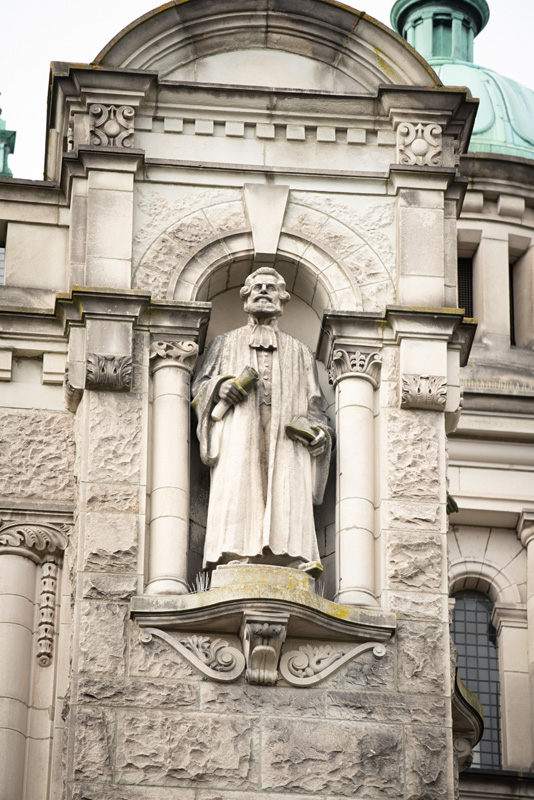Along the exterior of the Legislative Library are 14 statues of individuals who held prominence in the earlier history of the territory now known as British Columbia. One of those statues depicts Sir Matthew Baillie Begbie.
British Columbia’s first Chief Justice, Matthew Baillie Begbie, was born aboard a ship off the coast of Mauritius on May 9, 1819. Before settling in Victoria and accepting a job with the colonial government, Begbie was a successful lawyer in London, England. In 1858, Governor James Douglas appointed Begbie as the first judge of the mainland Colony of British Columbia. As one of the few European settlers with any formal legal training, Begbie oversaw the drafting of most of the legislation of the colony, and later, the province of British Columbia. Judge Begbie died in Victoria in 1894, and is buried in Ross Bay Cemetery, Victoria.
Despite his prominent role in the formation of the province’s justice system, Judge Begbie leaves a controversial legacy in British Columbia. In an event referred to as the Chilcotin War of 1864, several members of the Tsilhqot'in Nation killed workers constructing a road through their territory. The exact cause of the attack is not known but it occurred in an atmosphere of increasing unrest, as survey parties and pack trains entered the Chilcotin Plateau in the wake of the Cariboo gold rush. The attack and several other small skirmishes between this group of Tsilhqot'in members and settlers in the area resulted in the deaths of 21 people. As a result of the conflict, a colonial militia was formed and, soon after, several Tsilhqot'in members agreed to come to the militia camp for peace talks. Instead, the peace party was seized and put on trial for murder. The trial was presided over by Judge Begbie and five Tsilhqot'in Chiefs were found guilty and hanged in October of 1864. A sixth Chief was later captured and hanged in New Westminster. In 2014 - the 150th anniversary of the executions - B.C. Premier Christy Clark formally apologized to the Tsilhqot’in people for these unjust actions. In 2018, Prime Minister Justin Trudeau exonerated the Chiefs and offered an apology to six of the current Tsilhqot'in Chiefs on the floor of the House of Commons.

